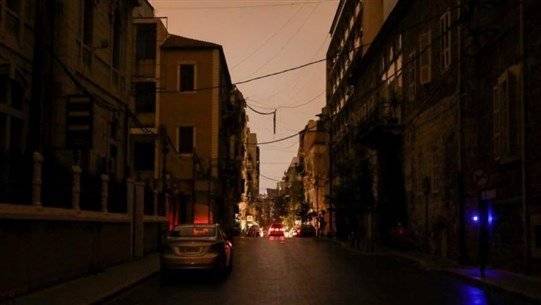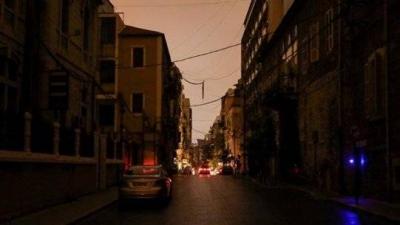The government is looking for temporary and exceptional solutions to ease the severity of the electricity outage crisis, which has not found a resolution due to internal obstacles and external pressures to implement reforms in the sector. The path to a solution seems complex, as plans encounter difficulties in implementation, compounded by the government's inability to provide additional funding for the sector. Warnings of Lebanon plunging into total darkness occur almost weekly, with the darkness rarely stemming from technical malfunctions over the past three years. Most causes revolve around delays in payments, late fuel shipments, and other financial obstacles, most notably the World Bank's conditions for reforming the electricity sector, foremost among them the establishment of a regulatory body for the sector, which has been pending for years, in exchange for funding to import gas from Egypt and electricity from Jordan through Syrian territories.
However, the temporary solutions that the government finds itself resorting to have led to the use of sub-standard fuel to avoid total darkness. The Lebanese government granted the Electricité du Liban (EDL) permission to utilize a portion of "Grade B" fuel stored at the Jieh and Zouk power plants (two old and small facilities), amounting to approximately 40,000 tons, in order to avoid complete darkness as the gas supply for the Zahrani plant, one of the largest production facilities in Lebanon, neared exhaustion. Energy Minister Walid Fayad stated after meeting with Lebanese President Michel Aoun on Friday that the fuel problem had been addressed with the participation and guidance of Prime Minister Najib Mikati and the board of directors of Electricité du Liban.
Former General Director of Investment at the Ministry of Energy, Ghassan Baydoun, described the recourse to this solution as "an expired medicine, which may have little or no effect and could have side effects." He explained to "Asharq Al-Awsat" that the shipment believed to have arrived in Lebanon at the beginning of the current year was "non-compliant with specifications," leading the operating company of the Zahrani plant to reject its use, prompting Electricité du Liban to store it in the tanks of the Jieh and Zouk plants, which have been out of service for months, without the state making a decision to return the shipment to its source.
Baydoun stated that it seems the inability to secure fuel for the Zahrani and Deir Ammar plants (two modern and large facilities) has led the ministry to use it in the older plants (Jieh and Zouk). However, he cautioned that operating the two plants with this fuel could damage the production unit, and half of their production capacity would be lost, as they would produce only half of what they could produce if using "Grade A" compliant fuel at modern facilities. He added that if there had been any operator for the Zouk and Jieh plants, they would have refused to use it, noting that the contract for operating the plants expired some time ago, and Electricité du Liban is now responsible for their operation.
It is clear that the government's collision with a challenging reality, due to its inability to secure fuel for the modern plants, is the reason behind this decision. The Energy Minister did not hide the extent of the crisis on Friday, pointing out that the renewal of the Iraqi offer allowing Lebanon to take an additional million tons of fuel will come after the first quantity runs out in September, noting that this quantity can provide about three hours of electricity supply. He also indicated that "we previously relied on the World Bank and Egyptian gas and electricity from Jordan, but the World Bank has set new conditions, such as increasing tariffs and preparing a plan to cover costs and starting procedures to establish the regulatory body, and we are working on this matter."
He stated, "We received a decision from the board of directors of Electricité du Liban to increase tariffs in conjunction with increasing electricity supply," but "what is now required is the approval of the Ministry of Finance on this matter and then the government’s approval."
Lebanon needs about 3,000 megawatts of electricity, but a decline in financial capability to purchase fuel has limited its production recently to hydroelectric stations "that have a production capacity of about 100 megawatts" and plants powered by fuel supplied under the agreement with the Iraqi government. Lebanon started implementing the agreement in August last year, which provides for shipments of crude oil to be exchanged with foreign companies for about 40,000 tons of fuel to power the production stations.
Efforts to import gas from Egypt and electricity from Jordan have failed for a year, as the funding body (the World Bank) set a condition requiring the beginning of implementation of reforms. The United States stipulated the World Bank's approval of the funding in exchange for allowing Cairo and Amman exceptions from the "Caesar Law" sanctions, as the gas and electricity would pass through Syrian territories.
Baydoun believes that immediate implementation of the reforms is challenging, given that the government is currently a caretaker one, complicating tariff increases and the appointment of members to the regulatory body. Moreover, waste continues, the network is unregulated, and service providers do not fulfill their duties entirely. He remarked, "Implementing reforms today seems difficult, and the emergency plan prepared by the ministry is challenging to apply, especially the issue of removing abuses amid the crises affecting the security apparatuses, monitoring meters, issuing bills regularly, and collecting dues." He added, "When there was a functioning state, the project to increase tariffs and remove abuses was not implemented; how will they be able to implement it today? How will the faltering government secure $200 million to implement the plan?" which aims to increase electricity supply to about 10 hours daily, noting that tariff increases are one of the international demands for reforming the sector and reducing its deficit.
Baydoun disclosed that the institution had outstanding unpaid bills from subscribers amounting to about 1 trillion Lebanese pounds ($665 million) at the moment the economic crisis erupted in 2019, and these were not collected then, expressing his conviction that there is poor management of the institution, which requires reform.




